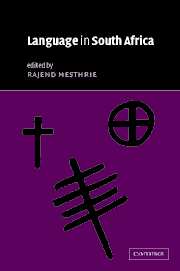Book contents
- Frontmatter
- Contents
- List of maps
- List of contributors
- Acknowledgements
- List of phonetic symbols
- List of abbreviations
- Introduction
- Part I The main language groupings
- Part II Language contact
- 9 Fanakalo: a pidgin in South Africa
- 10 Mutual lexical borrowings among some languages of southern Africa: Xhosa, Afrikaans and English
- 11 Code-switching, mixing and convergence in Cape Town
- 12 Code-switching in South African townships
- 13 Intercultural miscommunication in South Africa
- 14 Women's language of respect: isihlonipho sabafazi
- 15 The sociohistory of clicks in Southern Bantu
- 16 The political economy of language shift: language and gendered ethnicity in a Thonga community
- 17 From second language to first language: Indian South African English
- 18 Black South African English
- 19 The lexicon and sociolinguistic codes of the working-class Afrikaans-speaking Cape Peninsula coloured community
- 20 An Introduction to Flaaitaal (or Tsotsitaal)
- 21 Language and language practices in Soweto
- Part III Language planning, policy and education
- Index
- References
12 - Code-switching in South African townships
from Part II - Language contact
Published online by Cambridge University Press: 22 September 2009
- Frontmatter
- Contents
- List of maps
- List of contributors
- Acknowledgements
- List of phonetic symbols
- List of abbreviations
- Introduction
- Part I The main language groupings
- Part II Language contact
- 9 Fanakalo: a pidgin in South Africa
- 10 Mutual lexical borrowings among some languages of southern Africa: Xhosa, Afrikaans and English
- 11 Code-switching, mixing and convergence in Cape Town
- 12 Code-switching in South African townships
- 13 Intercultural miscommunication in South Africa
- 14 Women's language of respect: isihlonipho sabafazi
- 15 The sociohistory of clicks in Southern Bantu
- 16 The political economy of language shift: language and gendered ethnicity in a Thonga community
- 17 From second language to first language: Indian South African English
- 18 Black South African English
- 19 The lexicon and sociolinguistic codes of the working-class Afrikaans-speaking Cape Peninsula coloured community
- 20 An Introduction to Flaaitaal (or Tsotsitaal)
- 21 Language and language practices in Soweto
- Part III Language planning, policy and education
- Index
- References
Summary
INTRODUCTION
Language contact, including contact within the Bantu language family, is not a new phenomenon. However, switching languages or linguistic varieties within the same conversation, or code-switching (CS) as it is termed, is a dynamic and growing phenomenon as contact between speakers of various languages throughout the world continues to increase. This chapter offers an introduction to the relationship between social history and linguistic studies on CS in South African townships, as well as some contexts within which CS is practised in South African townships. Thereafter, a sociohistorical overview of a variety of perspectives on CS research will be given.
The term ‘code-switching’ will be used in this chapter to include full constituents as well as single lexemes. No distinction will be made between ‘noun switching’ (Poplack 1981: 171), ‘nonce borrowings’ (Sankoff and Vanniarajan 1990), code-mixing (CM) (Kachru 1978) and code-switching. Myers-Scotton (1993b: 24) notes in this regard that many CS researchers do not make clear how they classify single lexemes. In particular they are not willing to label as borrowed forms all singly occurring forms drawn from another language, so ‘code-mixing’ becomes a compromise designation. The distinction between CS and borrowing is also still unresolved. In this chapter the term ‘code-switching’ will include references to singly occurring forms as well as to intrasentential and intersentential CS within, as well as across, conversational turns.
- Type
- Chapter
- Information
- Language in South Africa , pp. 235 - 257Publisher: Cambridge University PressPrint publication year: 2002
References
- 14
- Cited by



